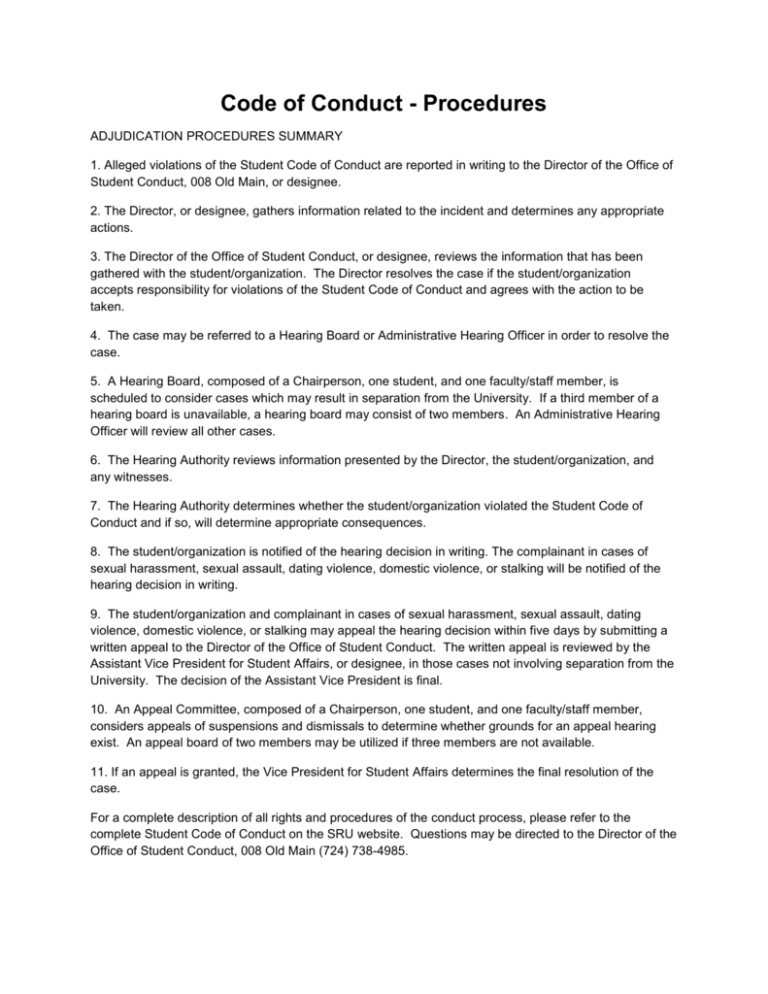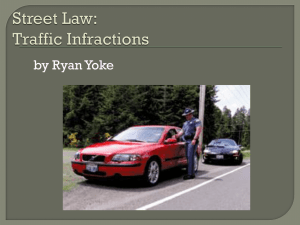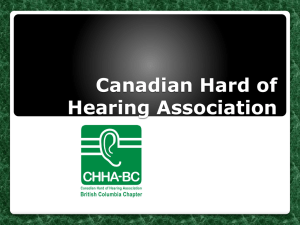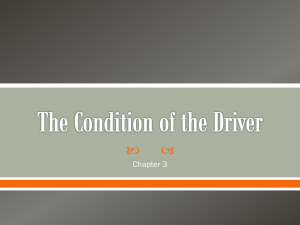
Code of Conduct - Procedures
ADJUDICATION PROCEDURES SUMMARY
1. Alleged violations of the Student Code of Conduct are reported in writing to the Director of the Office of
Student Conduct, 008 Old Main, or designee.
2. The Director, or designee, gathers information related to the incident and determines any appropriate
actions.
3. The Director of the Office of Student Conduct, or designee, reviews the information that has been
gathered with the student/organization. The Director resolves the case if the student/organization
accepts responsibility for violations of the Student Code of Conduct and agrees with the action to be
taken.
4. The case may be referred to a Hearing Board or Administrative Hearing Officer in order to resolve the
case.
5. A Hearing Board, composed of a Chairperson, one student, and one faculty/staff member, is
scheduled to consider cases which may result in separation from the University. If a third member of a
hearing board is unavailable, a hearing board may consist of two members. An Administrative Hearing
Officer will review all other cases.
6. The Hearing Authority reviews information presented by the Director, the student/organization, and
any witnesses.
7. The Hearing Authority determines whether the student/organization violated the Student Code of
Conduct and if so, will determine appropriate consequences.
8. The student/organization is notified of the hearing decision in writing. The complainant in cases of
sexual harassment, sexual assault, dating violence, domestic violence, or stalking will be notified of the
hearing decision in writing.
9. The student/organization and complainant in cases of sexual harassment, sexual assault, dating
violence, domestic violence, or stalking may appeal the hearing decision within five days by submitting a
written appeal to the Director of the Office of Student Conduct. The written appeal is reviewed by the
Assistant Vice President for Student Affairs, or designee, in those cases not involving separation from the
University. The decision of the Assistant Vice President is final.
10. An Appeal Committee, composed of a Chairperson, one student, and one faculty/staff member,
considers appeals of suspensions and dismissals to determine whether grounds for an appeal hearing
exist. An appeal board of two members may be utilized if three members are not available.
11. If an appeal is granted, the Vice President for Student Affairs determines the final resolution of the
case.
For a complete description of all rights and procedures of the conduct process, please refer to the
complete Student Code of Conduct on the SRU website. Questions may be directed to the Director of the
Office of Student Conduct, 008 Old Main (724) 738-4985.
C. Resolution
Step 1: Information Gathering Process
1. Any member of the University community, including, but not limited to, students, faculty members,
local police agencies, and citizens, may file a referral involving alleged violation(s) against any
student/organization. Referrals of misconduct should be made in writing and filed with the Office of
Student Conduct.
2. Alleged violations involving a student/organization may be referred by an individual, department (unit
of the University), including, but not limited to, University Police, Residence Life, Student Life, Academic
Records, Faculty, Health Services, and the Library, as well as outside agencies, individuals and police
departments. In such cases, a representative from the department should present the allegations of
misconduct in writing to the Office of Student Conduct.
B. Information Gathering
1. Upon receipt of a report of student/organization misconduct, the Director of the Office of Student
Conduct, or designee, will determine whether the referral warrants action under the Student Code of
Conduct.
2. If it is determined that the referral warrants further consideration, the Conduct Administrator assigned
will conduct an information gathering process. The Conduct Administrator may provide written notification
to the student/organization of the allegations made and who filed them prior to adjudiating the
referral. The Conduct Administrator may consult with the student/organization and the individual
reporting the alleged violations and perform those activities necessary to determine if facts exist which
warrant the alleged violations. At the discretion of the university and when sufficient information is
presented, the university reserves the right to determine consequences for any referrals not involving a
separation from the university prior to meeting with the student allegedly in violation. Upon receipt of the
administrative sanction, the student would be afforded an opportunity to appeal the decision within 5 days
of receiving the notice of the sanction.
3. Notice of alleged violations against an organization will be sent to the President or designee and
advisor as listed on University registration documents. It is the responsibility of each organization to
register with the University each year and to keep officer and advisor records current.
4. The student/organization may not contact the individual who reported the alleged violations and
supporting witnesses except as arranged by the Office of Student Conduct, or designee. Any attempts to
make contact with those initiating referrals may be deemed as threatening or intimidating and could lead
to additional violations under the Student Code of Conduct.
5. All students must cooperate with University disciplinary information gathering process. This includes
the expectation to respond to email correspondence, to respond truthfully to questions asked by
University officials, and to participate as witnesses in disciplinary hearings.
6. Notice of all disciplinary alleged violations and resulting proceedings will be communicated in writing to
the student’s Slippery Rock University assigned email address. The responsibility to respond to
disciplinary proceedings is not eliminated by failure on the student’s part to notify the University of change
of address.
Step 2: Resolution
1. If the Conduct Administrator or designee determines, after gathering information, that disciplinary
action is not warranted, the student/organization will be notified, in writing via SRU email address, that all
alleged violations have been withdrawn.
2. At the discretion of the University and when sufficient evidence is presented, the University reserves
the right to resolve any referrals not involving a separation from the University prior to meeting with the
allegedly in violation student. Upon receipt of the administrative sanction the student would be afforded
an opportunity to appeal the decision within 5 days of receiving the notice of the sanction.
3. If sufficient issues are unresolved, especially concerning the student's/organization's responsibility for
violations of the Student Code of Conduct, the Director, or designee, may refer the case to the
appropriate Hearing Authority. The University Hearing Board shall be used in those cases deemed by the
Office of Student Conduct to be sufficiently serious to warrant consideration of separation from the
University should the allegations be proven. All other referrals may be to Administrative Hearing Officers.
4. If the Director concludes from the information gathering process that the student/organization accepts
responsibility for a violation of the Student Code of Conduct, he or she will inform the student/organization
of the recommended disciplinary sanction.
a. If the student/organization agrees with the recommended sanction, that
student/organization may waive the right to a formal hearing so that the recommended sanction may be
put into effect. Once such a waiver of a hearing is signed by the student/organization, it may not be
rescinded nor may a hearing or appeal be requested.
b. If the student/organization disagrees with the sanction recommendation, the
student/organization may request that the case be referred to the appropriate Conduct Administrator for
resolution. The Conduct Administrator’s findings and conclusions will not be limited by the Conduct
Administrator’s or designee’s original sanction recommendation.
5. If the student/organization fails to meet as requested with the Director of the Office of Student
Conduct, or designee, action will be taken in absentia.
a. The Director may refer the case to the appropriate Hearing Authority for resolution.
b. The Director may apply administrative sanctions up to and including deferred
suspension. The student/organization will be notified in writing via SRU email address of the resolution of
the case and an administrative appeal option.
(1) If the student/organization disagrees with the administratively applied sanction,
the student/organization may petition in writing within five days of the notification of sanction to the
Assistant Vice President for Student Affairs to review the case.
(2) The Assistant Vice President for Student Affairs will evaluate the
student's/organization’s petition to determine the reason for failing to fulfill the obligation to meet with a
Conduct Administrator as well as any information presented that warrants changing the administrative
sanction.
(3) The Assistant Vice President for Student Affairs may deny the
student's/organization’s petition, remand the case to the Director of the Office of Student Conduct for
further information gathering, dismiss some or all of the alleged violations, or reduce the sanction applied.
(4) The decision of the Assistant Vice President for Student Affairs is final.
Step 3: A Campus Hearing (if no resolution is reached in Step 2)
Hearing Authorities
1. Disciplinary cases may be resolved through formal hearing procedures conducted by an
Administrative Hearing Officer or by the University Hearing Board. The University Hearing Board shall be
used in those cases deemed by the Director of the Office of Student Conduct to be sufficiently serious to
warrant consideration of separation from the University should the alleged violations be proven. All other
referrals will be to Administrative Hearing Officers.
2. The roster of Hearing Board appointments will consist of the following:
a. Chairpersons appointed by the Director of the Office of Student Conduct or designee of the
University for a specified time period: The Chairperson is responsible for facilitating the hearing
procedures, ensuring all members of the board are heard during deliberation, and documenting the
Hearing Boards findings. When determining a sanction, the chairperson must ensure that all sanctions fall
within the sanction range provided by the Director of the Office of Student Conduct.
b. Students appointed by the Student Government Association President and/or the Assistant
Vice President for Student Affairs or designee for a specified time period;
c. Faculty/staff appointed by the Director of the Office of Student Conduct or designee for a
specified time period.
3. Each appointing party may designate alternates for each appointee and/or may add or remove
appointees as needed.
4. One Chairperson, one faculty/staff representative, and one student representative drawn from the
Hearing Board roster will be scheduled to hear a case. All three hearing board members must be present
to hear the case.
5. The Director of the Office of Student Conduct, or designee, has general authority as required by
circumstances to name Hearing Board members.
6. Administrative Hearing Officers will be appointed by the Director of the Office of Student Conduct or
designee and may be drawn from the Hearing Board roster.
Hearing Procedures
1. In cases involving more than one student/organization, the Conduct Administrator will determine if a
joint hearing or separate hearings will be scheduled.
2. The Conduct Administrator shall notify the student/organization, in writing, of the alleged violations
filed, who presented the alleged violations, the time, date, and place of the alleged misconduct and the
rule(s) alleged to be violated, sufficient details of the alleged violations to enable the preparation of a
response, and the sanctions which may be applied if the student/organization is found in violation of the
specified charges. The notice will also indicate the Hearing Authority (Hearing Board or Administrative
Hearing Officer) and the time, date, and location of the hearing.
3. Prior to the hearing date, the student/organization, upon request, will be permitted to review information
obtained or developed during the information gathering process.
4. Prior to the day of the hearing, the student/organization must present to the Conduct Administrator a
list of witnesses and the order those witnesses should be called to testify.
5. The hearing will be scheduled and notice provided to the student via their Slippery Rock University
email address.
6. The student/organization or Conduct Administrator may request postponement of a scheduled hearing
in writing prior to the start of the hearing. This written request must include the reason(s) that a
postponement is being requested. The Chairperson of the Hearing Board or Administrative Hearing
Officer shall rule on this request. These requests will be decided on a case-by-case basis and only
granted in the most extenuating circumstances.
7. The hearing will be closed to the University community. Those permitted to be present are:
a.
the student allegedly in violation and his or her advisor or the senior officer of the accused
organization allegedly in violation and his or her advisor (Observers will not be permitted).
b.
the alleged victim of the student's/organization's alleged actions or activities and his or her
advisor, as appropriate to comply with all relevant laws;
c.
the members of the Hearing Board or Administrative Hearing Officer;
d.
the Conduct Administrator or designee;
e.
officials acting within their capacity in the Office of Student Conduct;
f.
witnesses as called to present information, who may only be present during their testimony.
8. The Chairperson or Administrative Hearing Officer may order a disruptive person to leave the hearing.
9. The student/organizational representative allegedly in violation and the complainant (including victims
of sexual harassment, sexual assault, dating violence, domestic violence, and stalking) may each be
accompanied in the hearing by one advisor who may be, but is not limited to, a faculty member, student,
staff member, legal counsel or any other person of the student’s choice. The advisor may not speak
directly to the Hearing Authority. He or she may only consult and interact privately with the advisee. (Any
advisors/attorneys that speak at hearings or are disruptive will be immediately asked to leave the hearing.
The hearing will be suspended until the disruptive party departs from the room.) In cases of sexual
harassment, sexual assault, dating violence, domestic violence, and stalking, all questions will be asked
through the hearing administrator or designee, to prevent direct interrogation.
10. The Conduct Administrator or designee who conducted the information gathering process shall
present to the Hearing Authority all findings and evidence relating to the alleged violations against the
student/organization.
11. The student/organizational representative allegedly in violation will be given the opportunity to hear
the information and evidence presented and to question witnesses who present information.
12. The student/organizational representative allegedly in violation may present information and
evidence or make argument.
13. The student/organizational representative allegedly in violation may present witnesses.
14. The student/organizational representative allegedly in violation may reserve the right to remain
silent. Should the student/organizational representative exercise the option of remaining silent, the
Hearing Authority may take a negative inference.
15. Each student who presents information at the hearing will be informed that they are expected to tell
the truth, and that any false information given by them to the Hearing Authority could lead to violations of
the Student Code of Conduct being filed against them. All persons presenting information before the
Hearing Authority must swear an oath to tell the truth, the whole truth, and nothing but the truth.
16. The Chairperson or Administrative Hearing Officer may separate and/or provide accommodations for
witnesses; these may be in a different area and/or by phone.
17. The Chairperson or Administrative Hearing Officer may place reasonable limits on the questions
asked and information presented in the hearing. This would include limiting witness information that is
redundant or not relevant to the alleged violations.
18. The Hearing Authority will determine the outcome of the case on the basis of the evidence presented
even if the student/organizational representative fails to appear at the hearing or chooses not to present
information or evidence.
19. Hearsay evidence alone may not be used to establish a fact necessary to establish responsible or
not responsible. If necessary to ensure the safety of students, faculty, staff and visitors, alleged violations
concerning violence or threats of violence may be pursued without cooperation from the victim/ person
who has experienced harm.
20. A record will be made of the proceedings. The student/organization, upon written request, may
receive a copy of the record at a reasonable cost.
21. After all information has been presented; the Hearing Authority will adjourn to closed discussions.
22. The Hearing Authority will determine whether the preponderance of evidence supports that the
student/organization is responsible for violating the Student Code of Conduct. For a Hearing Board, the
decision will be determined by a simple majority where each member of the Hearing Board, including the
Chairperson, will have one vote. (The preponderance is based on the more convincing evidence and its
probable truth or accuracy, and not on the amount of evidence.)
23. If the Hearing Authority finds the student/organization responsible for violations of the Student Code
of Conduct, the Hearing Authority will review the student's/organization’s disciplinary history, academic
record and the range of appropriate sanctions established by the University for that individual
referral. The Hearing Authority will then recommend to the Assistant Vice President for Student Affairs
the appropriate sanction for the case, which must be based upon the previously set range. The Assistant
Vice President for Student Affairs will make the final sanction decision, which must be based upon the
range provided to the Hearing Board.
24. The Chairperson or Administrative Hearing Officer will prepare a written statement of the findings
indicating with reasonable specificity the facts and reason of the decisions made. This statement will be
presented to the Conduct Administrator following the hearing.
25. Within five business days of receipt of the written statement of findings, the Director of The Office of
Student Conduct will notify the student/organization and the complainant in cases involving sexual
harassment, sexual assault, dating violence, domestic violence, and stalking in writing via their assigned
SRU email address of the Hearing Authority’s decision.
26. Electronic copies of hearings are available to students participating in the hearing. Students must
request a file via email. The student requesting the electronic file must provide to Student Conduct a
USB flash drive. The USB flash drive can be dropped off in 008 Old Main. Please be sure to include
your name and address on the USB flash drive. Please allow two weeks to turnaround a request for an
electronic file. For additional information, please contact Student Conduct at 724-738-4985.








